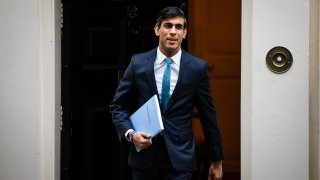
- Rishi Sunak announced that fuel duty will be reduced by 5 pence per liter for 12 months, a cut he told Parliament will be worth £5 billion ($6.6 billion), starting from 6 p.m. U.K. time on Wednesday.
- The level of fuel duty, a substantial contributor to British public finances, has been frozen at 57.95 pence per liter since 2011.
- Sunak also revealed plans to double the government's household support fund to £1 billion for those affected by higher energy costs.
LONDON — U.K. Finance Minister Rishi Sunak on Wednesday announced an immediate cut to fuel taxes and a longer-term tax reduction for workers in a bid to mitigate the country's historic hit to living standards.
In his Spring Statement, Sunak announced that fuel duty will be reduced by 5 pence per liter for 12 months, a cut he told Parliament will be worth £5 billion ($6.6 billion), starting from 6 p.m. U.K. time on Wednesday. The government hopes the cut will reduce the cost of gasoline at the pumps amid a surge in global oil prices.
The level of fuel duty, a substantial contributor to British public finances, has been frozen at 57.95 pence per liter since 2011.
Sunak also revealed plans to double the government's household support fund to £1 billion for those affected by higher energy costs.
Solar pumps, heat pumps and other similar measures will be subject to zero value-added tax (a tax on goods and services), down from 5%.
Cost of living crisis
Money Report
The pressure had been on Sunak to address the spiraling cost of living crisis in the U.K., with households facing record rises in energy bills and inflation running at multi-decade highs and expected to worsen as the fallout from the Russia-Ukraine conflict intensifies.
U.K. inflation came in at 6.2% in February, new figures showed on Wednesday, its highest since March 1992 and well ahead of consensus expectations among economists.
The Bank of England expects inflation to reach 8% in the second quarter, and has cautioned that double-figure prints are not inconceivable before the end of the year if Russia's assault on Ukraine and subsequent global supply shortages persist.
A planned 10% increase to National Insurance (a tax on earnings) kicks in for many workers in April, while at the same time the U.K.'s energy price cap soars 54% to accommodate higher costs of oil and gas, exacerbating the squeeze on household income as consumer prices continue to head north.
In Wednesday's speech, Sunak announced that he would be raising the threshold at which workers begin paying national insurance by £3,000.
He also vowed to cut the basic rate of income tax from 20% to 19% in 2024, telling Parliament that this represented a "£5 billion tax cut over over 30 million people."
During the height of the coronavirus pandemic, Sunak launched a series multi-billion pound economic support packages, fueled by the country's largest peacetime borrowing levels in history.
In interviews over the weekend and in his annual Mais lecture given last month, however, Sunak has indicated that ever-expanding fiscal accommodation is not a strategy he wishes to sustain.
The U.K.'s Office for Budget Responsibility projects that for the fiscal year 2022/23, the underlying public debt to GDP ratio will be 83.5%, an improvement on October's forecast of 85.4%. The U.K.'s budget deficit is projected to reach 5.4% of GDP in 2021/22 before tapering off to 3.9% in 2022/23, 1.9% in 2023/24 and 1.3% in 2024/25.
The country's debt interest bill will reach £83 billion in 2022/23, Sunak cautioned.
The OBR also slashed its GDP growth forecast for this year from 6% to 3.8%
Measures may not be enough
"The Chancellor probably managed to avoid being tagged with the phrase 'talking a good game on tax cuts' by moving to increase the threshold on National Insurance and promising that the basic rate of tax will be cut in 2024," said Neil Birrell, chief investment officer at Premier Miton Investors.
"However, middle earners will still feel the squeeze. The reduction in growth forecasts and inflation predictions are probably not that reliable for this year given the uncertainty abounding, but the direction of both is clear; growth is going lower and inflation is going higher."
Although Sunak set forth a number of measures to help households weather the cost of living crisis, these "likely will not go far enough" to protect consumers given how drastic the outlook has become, according to Richard Carter, head of fixed interest research at Quilter Cheviot.
Carter said the rise to the national insurance threshold and basic income tax may "put more pounds in the pockets of voters ahead of the next general election," but may do little to help in the here and now as the war in Ukraine continues to push up oil prices, utility bills rise sharply in the spring and inflation begins to bite for businesses and households.
"While the unemployment rate is expected to be unaffected by the slowing of economic growth, it does feel as if we are entering a stagflationary period," Carter said.
"It will be difficult for the economy to emerge from this without some additional stimulus, but with interest rates on the rise it is a tricky balancing act for the government and the Bank of England."
Carter said the government will be hoping the improvement in public finances is not blown off-course by geopolitical events. However, he added the uncertain outlook "could get even foggier in the months ahead."






